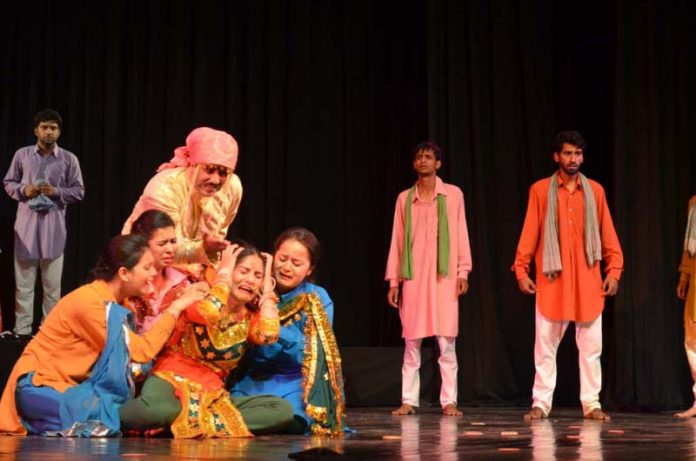Rajeshwar Singh ‘Raju’
“I regard the theatre as the greatest of all art forms, the most immediate way in which a human being can share with another the sense of what it is to be a human being. It was only in the theatre that I lived.” said Oscar Wilde, an eminent Irish author, poet and playwright.
It is a fact that those who do theatre have the same feel as their connection with this art form is more of a passion. It takes you into a new world where you explore yourself and come even nearer to humanity. It provides you a space where you interact with yourself and carry torch to create awareness among others thus fulfilling your responsibilities for being born as a human being on this planet Earth.
Now Theatre has gained so much of importance in our life that every year we celebrate World Theatre Day globally.
Theatre not only entertains but instigates the masses for their fundamental rights also. The history reveals that meaningful theatre was always a strong voice of suppressed class against the establishment. Street theatre is a revolutionary form of theatre, which advocates the genuine issues of masses. It has always an objective, however it depends upon the intellect of theatre activist how he takes it as it’s not merely a medium of expression to quench thirst for glamour but has a responsibility to fulfil as well.
We had the privilege of having stalwarts like Kavi Rattan, the doyen of theatre who laid the foundation of modern theatre in Jammu. His much talked about class productions like THANK YOU MR. GLAD, BEGUM KA TAKIYA, JULOOS, JASMA ODEN, KAHANI HAMARI TUMHARI, MEHAK GYULAB KI etc inspired many. Balwant Thakur, Director Natrang took regional theatre to a new height and exhibited his potential not only across the country but at abroad also and was conferred fourth highest civilian award of Republic of India ‘Padmashri’ for his colossal contributions in the field of theatre. His major productions like BAWA JITTO and GHUMAYEE have created history. The theatre journey of the temple city had appreciable contributions from Late Mushtaq Kak and Deepak Kumar also. In the new generation Abhishek Bharti, Ravinder Sharma have raised hopes but the point of concern is that, are we contributing for a theatre movement in the region?
In present scenario, we find every theatre group struggling hard for survival. The aid from art promoters or the organizations established to promote art and culture has always been a grave concern. Financial insecurity and lack of facilities hamper the ambitious lot to put forth their ideas and execute same on stage. We do proclaim that theatre teaches us to emerge victorious even from the odd times but on ground you need some infrastructure and monetary assistance also to fight a battle against shortcomings in theatre. It forces local theatre groups to mushroom only during annual drama festivals organized at district level. However Natrang is an exception, which has its own studio wherein weekly theatre has been going on for years now.
However, on this special day, it is pertinent to add here that our theatre productions should focus more on the local Issues and folk of region should be an integral part of each production. Here I wish to add that the first Dogri theatre play SARPANCH, written by Pt. Dinu Bhai Pant has contributed immensely in movement for Dogri. It was so popular that it has been staged in almost every village of Jammu province with more than 200 performances to its credit. In 1970, when a three days’Akhil Bhartiya Dogri Lekhak Sammelan was organized by Dogra Himachal Sanskriti Sangam at Delhi, on the 2nd day of Sammelan i.e. November 30th , SARPANCH staged by Jammu and Kashmir Academy of Art, Culture & Languages at Mabalnkar Hall was inaugurated by the then Vice President of India Sh. Gopal Swarup Pathak.
It got standing ovation and on popular demand was repeated next day also. The historical reference of this play is in fact a response to those who have an excuse that there are very few theatre plays written in Dogri which makes it quite difficult to sort out one for production. But, those theatre directors who have excelled thus carving a niche in theatre not only at national level but at abroad also, have worked on theatre plays written in mother tongue Dogri thus contributing in preserving and promoting our language and cultural heritage through this potent form of expression. We have more than 130 theatre plays in Dogri. Ironically, many of the theatre directors prefer to stage those Hindi plays which have been widely staged across the country. In such cases one can copy only but cannot create at its own as the impression of others’ performances will always have a reflection on their performances.
Theatre is not for entertainment only. These days, there are demands that theatre should become an integral part of education as it gives confidence, makes one responsible and inspires to keep relax even at odd time to ensure a wise decision when it matters most to concentrate in life. On this day, let us take a pledge to do meaningful theatre, promote our mother tongue Dogri and cultural traditions and inspire other fellow theatre activists for the same.
Trending Now
E-Paper


